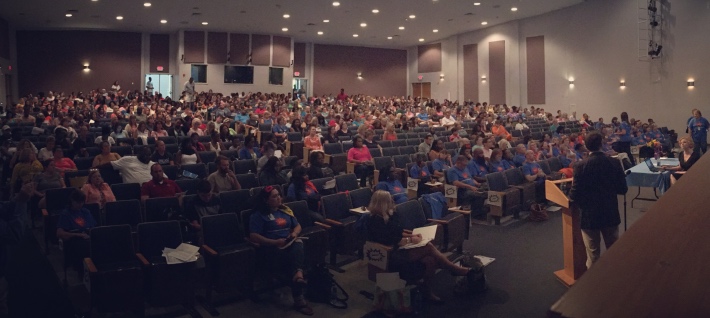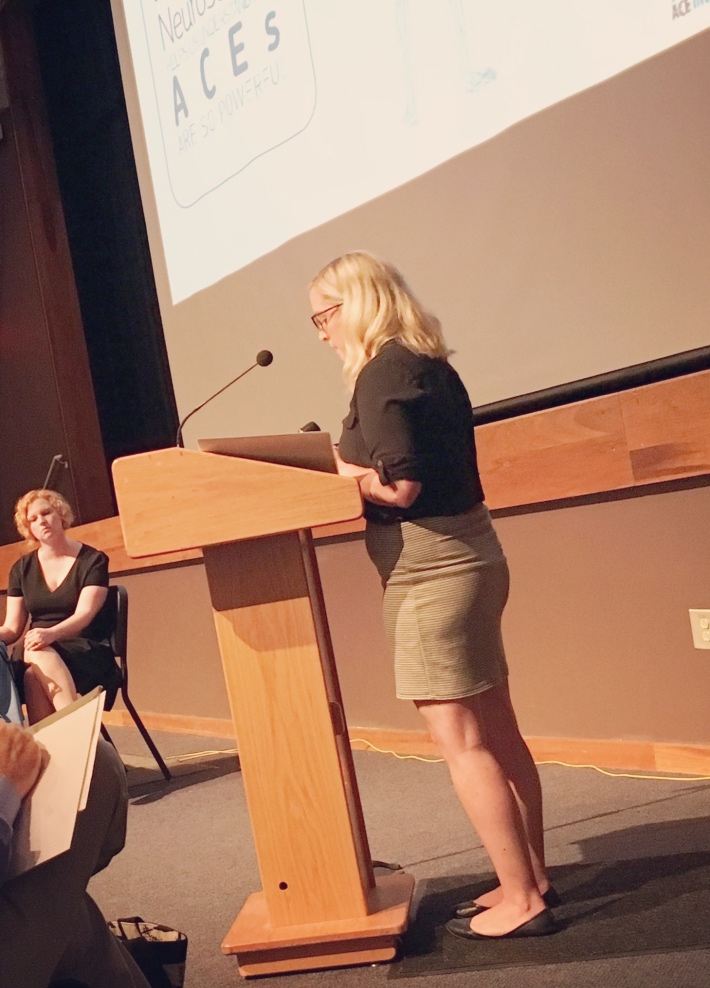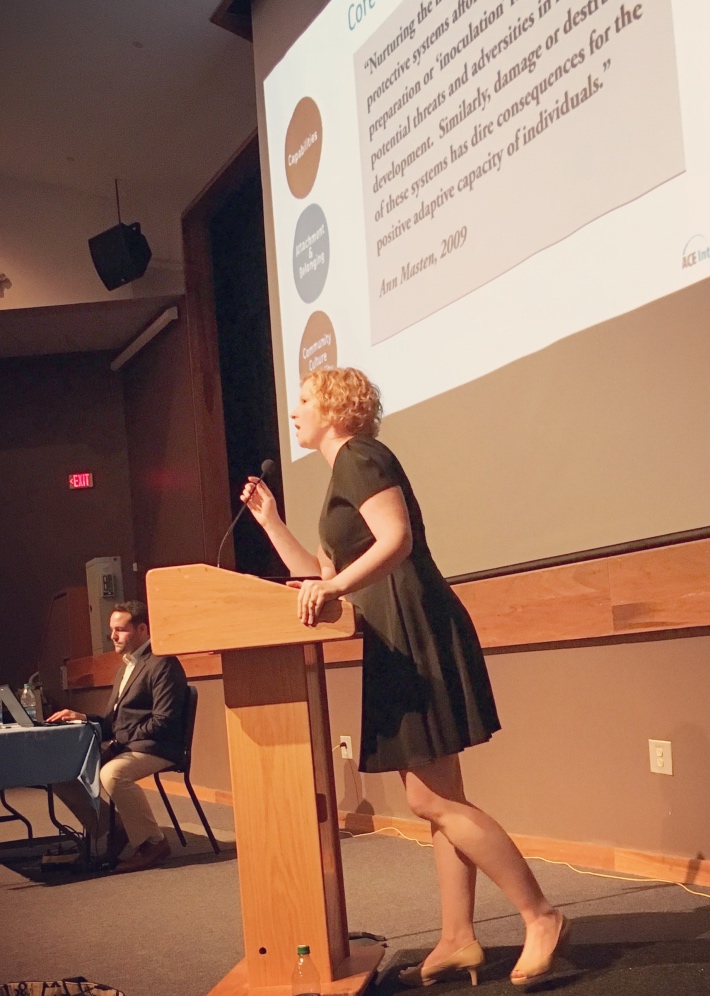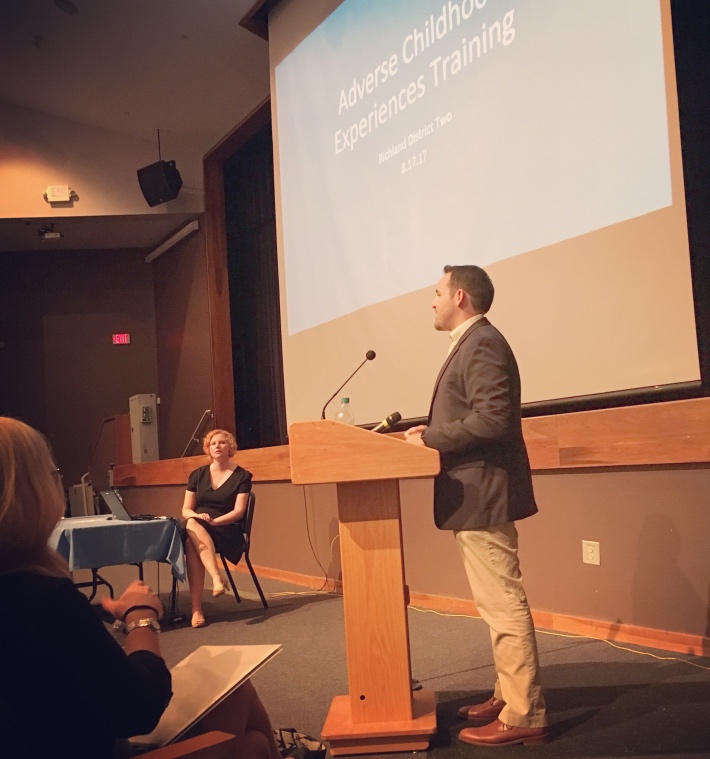Children’s Trust seeks to spread the message about adverse childhood experiences (ACEs) through its statewide initiative. Our ACE trainers are reaching many groups, including Richland District 2 educators at the start of a new school year, to explain why we are working diligently to prevent the trauma of childhood adversity, which can have serious lifelong consequences. Neil White, who tells the stories of Children’s Trust, covered this recent presentation.

Richland 2 educators gather in the district auditorium to hear a presentation on ACEs to start the school year.
As the school social worker for the Early Childhood Center in the Swansea-area Lexington District 4, Catherine MacIllwinen works with children who have faced trauma.
In her search to learn more about what she could do to help them, MacIllwinen came across information on adverse childhood experiences (ACEs), which in turn led her to the Children’s Trust of South Carolina website. There she discovered the organization’s ACE Initiative that seeks to empower communities across the state to prevent childhood adversities.

Catherine MacIllwinen discusses the neuroscience of ACEs.
When she attended the ACE Summit last November, a light bulb came on for her.
“It was incredible. It was really inspiring and life-changing for me, personally and professionally,” MacIllwinen said. “I wanted to be as much of a part of this (ACE Initiative) as I could. It’s such an important message that you can’t help but share it. Anybody I meet, I ask, ‘Have you heard about ACEs?’”
On Aug. 17 at the Richland District 2 auditorium, she got to deliver that very message to around 600 social workers, counselors, school psychologists, special education teachers, family intervention specialists, occupational therapists, and speech language therapists who work in the northeast Richland County school district.
The presentation on ACEs also included Chandler Harris, school counselor at Sandhills Primary School in Lexington 4, and Michael Shirley, community prevention coordinator at Children’s Trust.
The Richland 2 audience, a large majority of which knew little about ACEs and the Children’s Trust initiative, was receptive to the information that could assist them as they work with the students in the largest and fastest-growing public school district in the Midlands. Richland 2 serves more than 27,000 pre-K through 12th-grade students in 40 schools and centers.
The three ACE trainers provided information on how traumatic events in the lives of children can lead to poor health and social outcomes as adults. Research shows that children who are exposed to physical and emotional abuse, divorce, substance abuse, domestic violence and mental illness are much more likely to become adults with issues like depression, alcoholism, obesity, heart and liver disease, and decreased workplace performance.
The statewide ACE Initiative, which is funded by the BlueCross® BlueShield® of South Carolina Foundation, an independent licensee of the Blue Cross and Blue Shield Association, involves sending trainers to different groups to talk about ACEs and explain how Children’s Trust is collecting and disseminating data, building a prevention planning framework, and promoting sound legislative policy to address ACEs in our communities.

Chandler Harris tells how childhood adversity can lead to negative health and social outcomes as an adult
Harris understands a key component of learning this information is taking the responsibility to use it. She was pleased to get the opportunity to do that at the largest ACE presentation to date.
“When I learned about ACEs, it was really just a call to action for me and being passionate about the children and how ACEs play out in their lives. It’s a public health crisis, and if I know about it, I’m going to do what I can in order to help the children I serve,” Harris said.
“All of us have to do what we can to spread the message. The more people you have on the ground getting that message out there and doing the work, the more people are not going to forget hearing about this (ACE) study. They’re going to tell a friend and tell a family member, and it’s going to change perceptions of people’s behaviors and why they behave the way they do.”
Shirley noted during the presentation that a primary message is shifting the focus from “What’s wrong with you?” to one of “What happened to you?” when working with traumatized children. He pointed out that 62 percent of South Carolina residents have experienced at least one ACE.
“It’s worth asking the question and exploring underlying causes to the symptoms of household dysfunction, abuse and neglect,” Shirley said.

Michael Shirley speaks to the statewide ACE Initiative guided by Children’s Trust.
Another key component is knowing that what is predictable is preventable. By providing support to students and their families that helps them find resilience in their lives and directs them to the community resources they need, ACEs can be mitigated or prevented.
“We look forward to presenting to groups small and large because everyone needs to know they can do something about ACEs,” Shirley added. “It could be as simple as mentioning ACEs to a friend or co-worker or as complex as intervening on behalf of a child in an abusive household. Everyone has a role to play in sharing the news about ACEs, and everyone can make small but significant changes that go a long way.”
Cara Thompson, the Richland 2 program coordinator of family intervention services, believes the presentation can be of great benefit to the district’s employees as they connect with the kids they serve each day, especially the ones who are dealing with difficult circumstances in their home lives.
She’s confident the training will help them learn to look at students through a different lens regarding their behavior, their academic performance, their social relationships, and their cognitive development.
“We care about all those things deeply. This gives us a whole different frame of reference,” Thompson said. ““We value so much the relationships we have with our students. If there’s a problem going on with a kid, we want to be very careful not to jump to assumptions. We want to pause and ask what’s going on with these kids, what’s really driving this behavior, what they need, and how can we meet those needs to the best of our abilities.”
For MacIllwinen, the opportunity to spread the messages of ACEs to so many people at once was invigorating. She hopes that some of them will be inspired to become ACE trainers in the future.
“You just plant a seed,” MacIllwinen said. “You can’t hear about this and not think about it and then not do something about it.”




